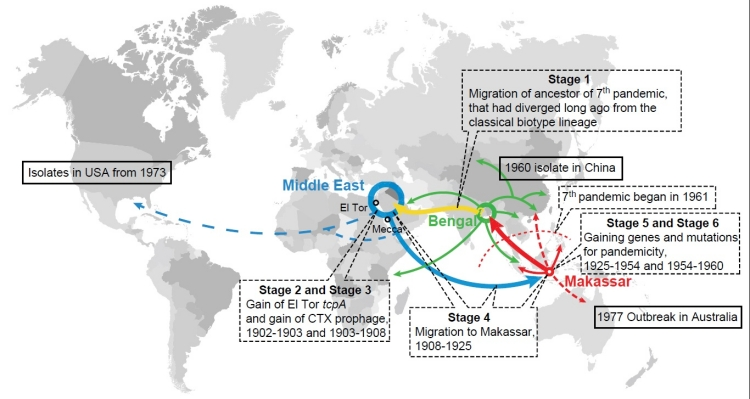NKU’s Microbiology Research Results Included in International Authoritative Textbook
Recently, the results of the research in which Professor Wang Lei’s team from Nankai University revealed the origin and complete evolutionary pathway of cholera pandemic strains, were written into Microbe (3rd Edition), an authoritative textbook published by the American Society for Microbiology. The book, which is compiled by Professor Michele S. Swanson of the University of Michigan, USA, et al., introduces the most fundamental and core knowledge and principles in the field of microbiology, and is one of the most classic and best-selling microbiology textbooks in the world.
The research and traceability analysis of microbial evolution mechanism has been a hot topic in the scientific community. It is important for understanding the formation mechanism of key pathogens, and is a key prerequisite for adopting effective prevention and control as well as treatment strategies for emerging and emergent infectious diseases. Nankai University has always held advantages in the field of pathogenic bacteria evolution mechanism and traceability analysis. The inclusion of research results in international authoritative textbook demonstrates that Nankai University’s research capability in this field has been recognized in the international academic community.

Schematic diagram of evolution and formation of current cholera pandemic strains as well as global migration
A small number of highly pathogenic and contagious pathogenic bacteria represented by the cholera pandemic strain cause worldwide pandemics, which have claimed millions of lives and have had a major impact on human history and social development, but their evolution and formation mechanism remains unknown. The team led by Professor Wang Lei, which has been engaged in the research on bacterial evolution at the genome level, has innovated comparative genomics research methods, and calibrated the rate of molecular evolution of bacteria. The team accurately analyzed all the previous samples of cholera pandemic strains preserved worldwide using these innovative theories and technologies, and discovered that the current cholera pandemic strain originated in South Asia and then migrated from South Asia to Middle East and to Indonesia as a result of human activities such as pilgrimages. In this process, the strain was subjected to selective pressure in new regions and acquired a series of special genes, resulting in high pathogenicity and high transmissibility.
The above findings were published in the Proceedings of the National Academy of Sciences (PNAS). The international authoritative academic journal Science covered the results at length in a paper entitled “How today’s cholera pandemic was born?” and described it as “a perfectly fine study.” The textbook Microbe (3rd Edition) describes the work, accompanied by the original illustrations.
According to introduction, this Nankai University study revealed the biological basis of the frequent occurrence of emerging infectious diseases, and stated that the frequency and rate of emerging infectious diseases will be greatly increased as a result of the emergence of new modes of transportation and more international exchanges. The relevant results also provide an important theoretical basis for adopting effective strategies to prevent and control the global pandemic of pathogenic bacteria.
Link to PNAS paper:
http://www.pnas.org/content/early/2016/11/08/1608732
Link to science report:
http://www.sciencemag.org/news/2016/11/how-today-s-cholera-pandemic-was-born
Link to Microbe (3rd Edition):
https://www.wiley.com/en-gb/Microbe,+3rd+Edition-p-9781683673729









